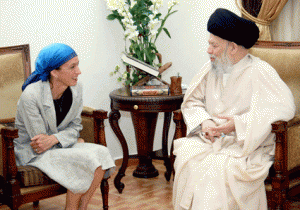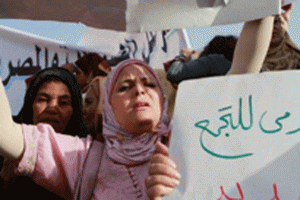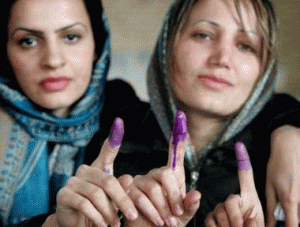Annette Fisher interviews FRANCES GUY, Senior Adviser on the Middle East at the Foreign and Commonwealth Office and former British Ambassador to Lebanon and Yemen.

Francis Guy meets with Mohammed Hussein Fadlallah
LONDON (INDEX). — Outspoken and sometimes controversial, Frances Guy public profile rose when she was forced to apologise for lauding Lebanon’s Grand Ayatollah Mohammed Hussein Fadlallah after his death in 2010. The White House had branded the Shia cleric “a terrorist” and the Foreign Office said that Guy’s internet posting praising Fadlallah as a “true man of religion” had been removed “after mature consideration”.
Index on Censorship sat with her to discuss the dilemmas of public service and free speech, as well as her vast experience in the Middle East and the challenges women face in that region.
INDEX: You have spoken about the importance of a free press and have actively supported journalists who have been threatened or imprisoned by their governments. How do you see the state of the free press in the Middle East in 2012?
FRANCES GUY: I cannot speak for all of the region but generally this is a good moment for press freedom in the Middle East. In fact, the advent of satellite television had already made it hard for dictatorial regimes to suppress all alternative sources of information. Al Jazeera was a breath of fresh air, not only to those limited by CNN’s version of world news, but also to all those whose only news came from state controlled television, radio and newspapers. I understand the press in Tunisia is effervescent in its reaction to so many years of uniformity and I know that every night in Baghdad I have a choice of more than 20 Iraqi TV stations to choose from.
All is not perfect of course and the counter-balance to releasing the lid on heavily censored press is to ensure responsible reporting. In Lebanon reporting was not always reliable, so while the press is relatively free there is scope for improving the quality of reporting.
The crisis in Syria has thrown open a new debate on what is information and how you can guarantee its’ authenticity. When access to outside journalists is so severely limited, unbiased reporting is almost impossible. One side’s truth becomes the other side’s lies. Access to the internet makes everyone a potential reporter but verification becomes ever more important.
INDEX: During your postings as Her Majesty’s representative in Yemen and Lebanon, you spoke passionately on greater freedoms for women and lesbian, gay, bisexual, and transgender (LGBT) citizens in those countries and the region. What do you think governments in these countries could realistically do to increase freedoms for these groups?
FG: One of the issues that shapes public perception is image. There is a debate going on in Iraq at the moment instigated by the women’s journalists association about the image of women in the press; whether it is in Egyptian or Turkish soap operas, where the women are often second class citizens, the brunt of jokes, or reduced to playing supporting roles or whether it is about air time given to women politicians. If governments wanted to improve the status of marginalised groups in society they can ensure that their own spokespeople are from these marginalised groups. Governments can lead by example by nominating women to office where they will have constant media exposure.

A protest for International Women’s Day in Egypt
Ending discriminatory laws would also help. Relatively simple acts like ensuring gender neutral language in the constitution can play a very important role. In Arabic nouns can be male or female. Some (men) argue that because common practice is that the plural male form in Arabic of e.g. the word citizens is assumed to include men and women then it is acceptable to have only the male form referred to in a constitution. But this leaves a legal ambiguity which can be exploited. It would be so easy to simply include the male and female forms in such texts or to make an explanatory note in every law explaining that the use of the masculine form is used in the sense of men and women on an equal basis without prejudice. I am not sure that any Arab state has done this.
Freedom of expression for LGBT citizens is regrettably even more problematic, but if governments could be persuaded to uphold the neutrality of rights enshrined in constitutions that would go a long way to ensuring those rights are truly applied to all.
INDEX: While you represented the British government, you blogged about matters of interest to you and to the British government. Over the past year, the media has questioned appropriateness of British foreign office representatives using social media as a tool of diplomacy. What are your thoughts?
FG: I think it might have been William Hague who said that there is an inherent contradiction between writing a readable/interesting blog and being a mouthpiece for government. I found it difficult to find something worth writing that did not betray confidences or risked upsetting someone. I therefore often wrote about subjects other than politics; the life cycle of the cedar tree, for example. But that is difficult to sustain.
I enjoyed blogging, and the experiment brought me into contact with groups I would never have met otherwise; bloggers in Lebanon who had been imprisoned for their views, for example. Who talks about them? And the LGBT community, similarly sidelined and oppressed. I think the bigger question is about transparency in government. If you believe that better government is open and transparent government then diplomats should be blogging.
INDEX: What limits on the freedom to express yourself did you encounter while you were an Ambassador?
PG: An Ambassador is always an ambassador 24 hours a day. You are judged as being Her Majesty’s Representative, not as an individual. Inevitably, there can be a tension between what you believe as an individual and what you are asked to say on behalf of your government. Even off the record you are an official representative. But that is part of the job and understood as such. If anything, the UN is often even more cautious, because it is formed of member states, i.e. governments so it is wary of criticising openly its members.
INDEX: You have spoken in the past about “freedom with responsibility”, could you elaborate?
PG: I am not sure of the context of the quote, but I am fairly sure that my intention would have been aimed at some irresponsible sections of the media, who do not verify information and who can (perhaps sometimes deliberately) put people’s lives in danger by stating unproven accusations as fact. Some Lebanese journalists are guilty of this, as indeed were many Ethiopians when I served there. The responsibility is to the truth but also to being conscious of the implications of printing/publicising some facts and not others. The British press is clearly not immune to a similar discussion — just because you can do something in the name of freedom of expression does not mean that you have to do it.
INDEX: Having served on the British government, you will be aware of accusations of hypocrisy when countries like the UK lecture other governments about their human rights records when the UK hasn’t “sorted out its own backyard”. What has been your reaction to these accusations?
FG: “Our own backyard” was less of a problem than our failure (as my interlocutors would see it) to deal with crimes that our politicians and armies had committed overseas. There were awkward moments though, when e.g. you are supporting quotas for women as a way to make progress in women’s representation in Parliament, when your own country under successive governments has not introduced quotas and has generally been wary of any kind of positive discrimination. My reaction though was always that freedom of expression, including in the ability to vote out your government if you disagree with it, guarantees a sound level of public debate about all issues.

Women having voted in Iraq
INDEX: You have recently taken up your post with UN Women in Iraq. What freedom of expression issues have you encountered since you arrived?
FG: I have attended was about the image of women in the media and how that can cement social perceptions. The challenge is to get Iraqi TV to show different kinds of women, playing different roles on screen. I am impressed with some of the phone-in programmes on radio which allow citizens to voice their frustrations with the failure of the state to deliver public services. In itself they will not change very much but it does mean that no politician can pretend that they don’t know what the issues are. For a state that was famous for its tyranny of expression, it is refreshing to find people so willing to express their views publicly.
INDEX: What do you see as the key battle grounds for free expression in the next five years?
FG: Five years is a long time in today’s fast moving media scene. For the next months, I think the issue of so-called citizen’s journalists, and immediate access to YouTube etc, will continue to be paramount. What moral limits are there on what should be accessible? Who decides? Can governments’ prevent documents being uploaded on YouTube? Do YouTube, Google etc have some moral parameters – should executions be so readily accessible? And for women, the debate on images of women, including the increasing accessibility of pornographic images will also continue. I think I will put on my wall the pictures of women weight lifters at the Olympic Games… what power and majesty (and defiance).
Annette Fisher is an international development professional based in London




